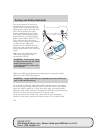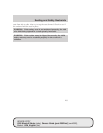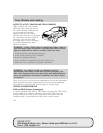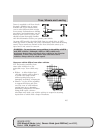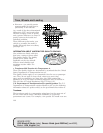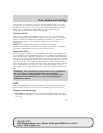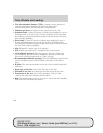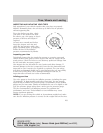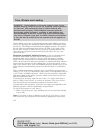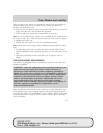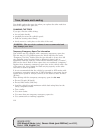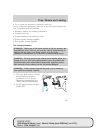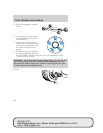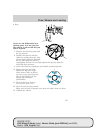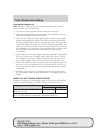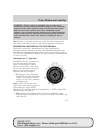
WARNING: Under-inflation is the most common cause of tire
failures and may result in severe tire cracking, tread separation
or ؆blowout؆, with unexpected loss of vehicle control and
increased risk of injury. Under-inflation increases sidewall
flexing and rolling resistance, resulting in heat buildup and
internal damage to the tire. It also may result in unnecessary
tire stress, irregular wear, loss of vehicle control and accidents.
A tire can lose up to half of its air pressure and not appear to
be flat!
Always inflate your tires to the Mazda recommended inflation pressure
even if it is less than the maximum inflation pressure information found
on the tire. The Mazda recommended tire inflation pressure is found on
the tire label or certification label which is B-Pillar or the edge of the
driver’s door. Failure to follow the tire pressure recommendations can
cause uneven treadwear patterns and adversely affect the way your
vehicle handles.
Maximum Permissible Inflation Pressure is the tire manufactures’
maximum permissible pressure and/or the pressure at which the
maximum load can be carried by the tire. This pressure is normally
higher than the manufacturer’s recommended cold inflation pressure
which can be found on either the tire label or certification label which is
located on the structure by the trailing edge of the driver’s door or the
edge of the driver’s door. The cold inflation pressure should never be set
lower than the recommended pressure on the tire label or certification
label.
When weather temperature changes occur, tire inflation pressures also
change. A 10° F(6° C) temperature drop causes a corresponding drop of
1 psi (7 kPa) in inflation pressure. Check your tire pressures frequently
and adjust them to the proper pressure which can be found on the tire
label or certification label.
If checking tire pressure when the tire is hot, (i.e. driven more than 1
mile [1.6 km]), never “bleed” or reduce air pressure. The tires are hot
from driving and it is normal for pressures to increase above
recommended cold pressures. A hot tire at or below recommended cold
inflation pressure could be significantly under-inflated.
To check the pressure in your tire(s):
1. Make sure the tires are cool, meaning they are not hot from driving
even a mile.
Note: If you have to drive a distance to get air for your tire(s), check
and record the tire pressure first and add the appropriate air pressure
REVIEW COPY
2005 Mazda B Series (mbs), Owners Guide (post-2002-fmt) (own2002),
Market: USA_English (fus)
Tires, Wheels and Loading
110



